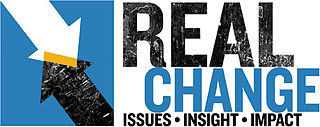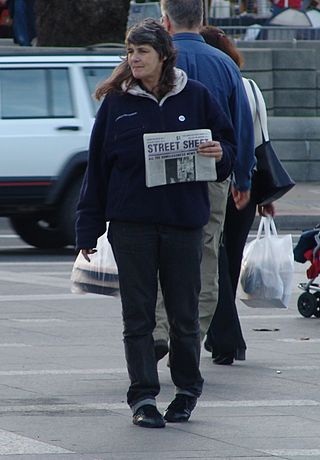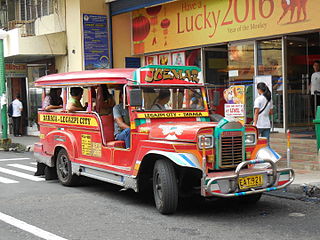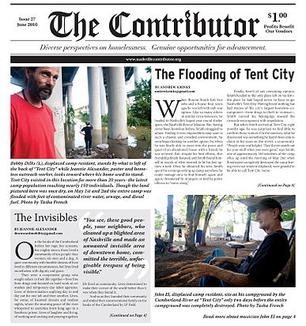
Transportation in the Philippines covers the transportation methods within this archipelagic nation of over 7,500 islands. From a previously underdeveloped state of transportation, the government of the Philippines has been improving transportation through various direct infrastructure projects, and these include an increase in air, sea, road, and rail transportation and transport hubs.

Oriental Mindoro, officially the Province of Oriental Mindoro, is a province in the Philippines located on the island of Mindoro under Mimaropa region in Luzon, about 140 kilometres (87 mi) southwest of Manila. The province is bordered by the Verde Island Passage and the rest of Batangas to the north, by Marinduque, Maestre de Campo Island, Tablas Strait and the rest of Romblon to the east, by Semirara and the rest of Caluya Islands, Antique to the south, and by Occidental Mindoro to the west. Calapan, the only city in the island, is the provincial capital and Mimaropa's regional center.

The Big Issue is a street newspaper founded by John Bird and Gordon Roddick in September 1991 and published in four continents. The Big Issue is one of the UK's leading social businesses and exists to offer homeless people, or individuals at risk of homelessness, the opportunity to earn a legitimate income, thereby helping them to reintegrate into mainstream society. It is the world's most widely circulated street newspaper.

Real Change is a weekly progressive street newspaper based in Seattle, Washington, USA written by professional staff and sold by self-employed vendors, many of whom are homeless. The paper provides them with an alternative to panhandling and covers a variety of social justice issues, including homelessness and poverty. It became weekly in 2005, making it the second American street newspaper ever to be published weekly. Real Change is a 501(c)(3) non-profit organization with an annual budget of 950,000 dollars.

Street newspapers are newspapers or magazines sold by homeless or poor individuals and produced mainly to support these populations. Most such newspapers primarily provide coverage about homelessness and poverty-related issues, and seek to strengthen social networks within homeless communities. Street papers aim to give these individuals both employment opportunities and a voice in their community. In addition to being sold by homeless individuals, many of these papers are partially produced and written by them.

Jeepneys, sometimes called jeeps, are minibus-like public utility vehicles, serving as the most popular means of public transportation in the Philippines. They are known for their crowded seating and kitsch decorations, which have become a widespread symbol of Philippine culture and art. A Sarao jeepney was exhibited at the Philippine pavilion at the 1964 New York World's Fair as a national image for the Filipinos.

Street Sense is a weekly street newspaper sold by self-employed homeless distributors ("vendors") on the streets of Washington, D.C., the capital city of the United States. It is published by the 501(c)(3) nonprofit Street Sense Media, which also produces documentary filmmaking, photography, theatre, illustration and poetry. The organization says this media, most of which is created by homeless and formerly homeless people, is designed to break down stereotypes and educate the community.

Sorbetes is a traditional ice cream originating from the Philippines and uniquely characterized by the use of coconut milk and/or carabao milk. Often pejoratively called "dirty ice cream", it is distinct from the similarly named sorbet and sherbet. It is traditionally peddled in colorful wooden pushcarts by street vendors called "sorbeteros". It is served in various flavors in small wafer or sugar cones and more recently, as a pandesal bread ice cream sandwich.
The International Network of Street Papers (INSP) is a Glasgow, Scotland, based trade organization founded in 1994 for over 100 street newspapers from 35 countries. INSP organises a yearly conference and provides technical assistance and a wire service for street papers.
Street News was a street newspaper sold by homeless people in New York City. Established in 1989, it was founded and launched by Hutchinson Persons and Wendy Oxenhorn, this was the starting of the American street newspaper movement, and provided a way of self-sufficiency to the many homeless and unemployed people in New York, starting at the price of 1 $ of which 25 cents were use to maintain the business and 75 was the profit for the vendors.
The Homeless Grapevine was a street newspaper sold by homeless in Cleveland, Ohio, United States. It was published by the Northeast Ohio Coalition for the Homeless (NEOCH) from 1992 to 2009. Vendors bought the paper for 25 cents per copy and sell them for 1 dollar. The papers attempted to be a voice for the homeless and content was entirely dedicated to homeless issues, much of it written by current or former homeless. It was a monthly magazine of 16 pages and as of 2004 had a circulation of 5,000 copies sold by 15–20 vendors. Sellers were often at The West Side Market, Public Square, E. 9th St., East 12th and Coventry.

The transportation system in Metro Manila is currently inadequate to accommodate the mobility and other basic needs of a densely populated metropolis, the result of many factors and problems that the government has failed to provide or address. Metro Manila exists in a state of near-permanent gridlock, with people and goods trapped by the very system that is supposed to move them quickly and efficiently. Car ownership has also risen dramatically, both because of the insufficient public transportation network and of cars being viewed as status symbols. In recent years, however, the Philippine government has been pushing to improve the mass transit system through various infrastructure projects, hoping to solve the interlinked problems of transportation, land use and environment.

The Big Issue Malawi is a street paper in Malawi. It is a bimonthly magazine sold only by homeless individuals. The project's facilitator is a local charity known as the "Culture Awakening Society"

The Contributor is a bi-weekly street newspaper published in Nashville, Tennessee, United States. The publication's content focuses on primarily social justice issues as they are framed by politics, music, art, culture, sports, homelessness and poverty. It is written by local journalists as well as people experiencing homelessness or working within the homeless community. The magazine's editors are Amanda Haggard and Linda Bailey.

According to official government statistics, in 2021, the Philippines had a poverty rate of 18.1%,, significantly lower than the 49.2 percent recorded in 1985 through years of government poverty reduction efforts. From 2018 to 2021, an estimated 2.3 million Filipinos fell into poverty amid the economic recession caused by the COVID-19 pandemic.

Fox Filipino was a Philippine pay television channel focused on Philippine-produced programming from GMA Network, TV5 and Sari-Sari Channel as well as Filipino movies from GMA Pictures, entries from the Cinemalaya Philippine Independent Film Festival, selected Asian and Hollywood movies, and selected foreign programming dubbed in Tagalog language.
The following is a list of events affecting Philippine television in 2022. Events listed include television show debuts, finales, cancellations, and channel launches, closures and rebrandings, as well as information about controversies and carriage disputes.

The automotive industry in the Philippines is the 9th largest in the Asia-Pacific region, with approximately 273.4 thousand vehicles sold in 2019. Most of the vehicles sold and built in the Philippines are from foreign brands. For the most part, the Philippines is dominated by Japanese automobile manufacturers like most of its ASEAN neighbors. The automobile production in the country is covered under the Philippine Motor Vehicle Development Program implemented by the Board of Investments. In addition, there are also a small number of independent firms who assemble and fabricate jeepneys and other similar vehicles, using surplus engines and drivetrain parts mostly from Japan.














